The PC Gamer website through the decades, from the '90s to today
A brief timeline of pcgamer.com's journey from "web site" to "website."
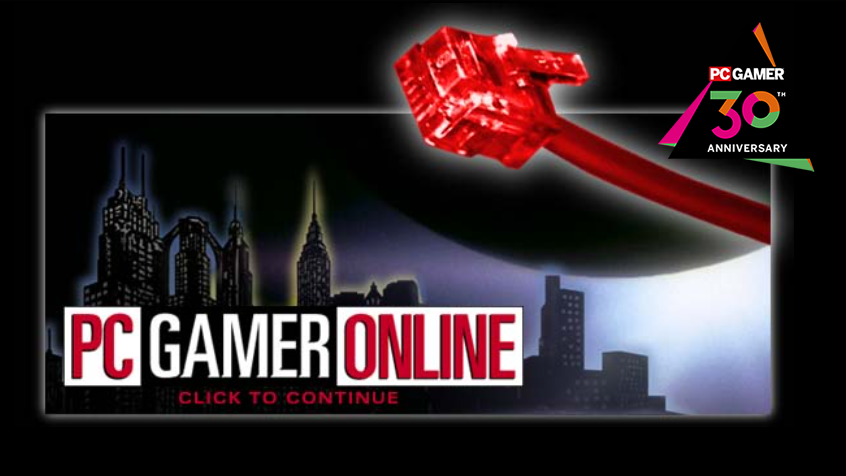
As of this month, we've got 30 years worth of PC Gamer magazine issues in the archives—quite a milestone! PC Gamer is also this website, though, and while we can't look quite that far back in PC Gamer's internet history, we can get fairly close.
Archive.org's earliest pcgamer.com capture shows us what we were talking about all the way back on October 18, 1996. Here are some of the headlines:
- Microsoft Hires Tetris Creator
- Quake Goes Retail
- MechWarrior 3 Programmer Joins Prey Team
Things have changed lots—what's "retail"?—but it's remarkable how much has remained the same, for better and worse.
As just one example (I haven't endeavored to be comprehensive here), the lengthy development periods we might associate with modern games like Ubisoft's Skull and Bones are nothing new: The "Prey" referred to in that third headline didn't release until 2006. In fact, Prey took so long that between that article's publication and its release, PC Gamer's editor-in-chief at the time, Gary Whitta, left PC Gamer and ended up in the game's screenwriting credits.
Many other staff members have come and gone over the years, but PC Gamer has remained through it all. (You know, like the cancellation of Prey 2 and eventual release of… Prey, again.)
As we celebrate 30 years of PC gaming coverage, here's a little look back on the evolution of pcgamer.com, from the mid '90s through now:
The 1990s
1996 — The glory of '90s web design
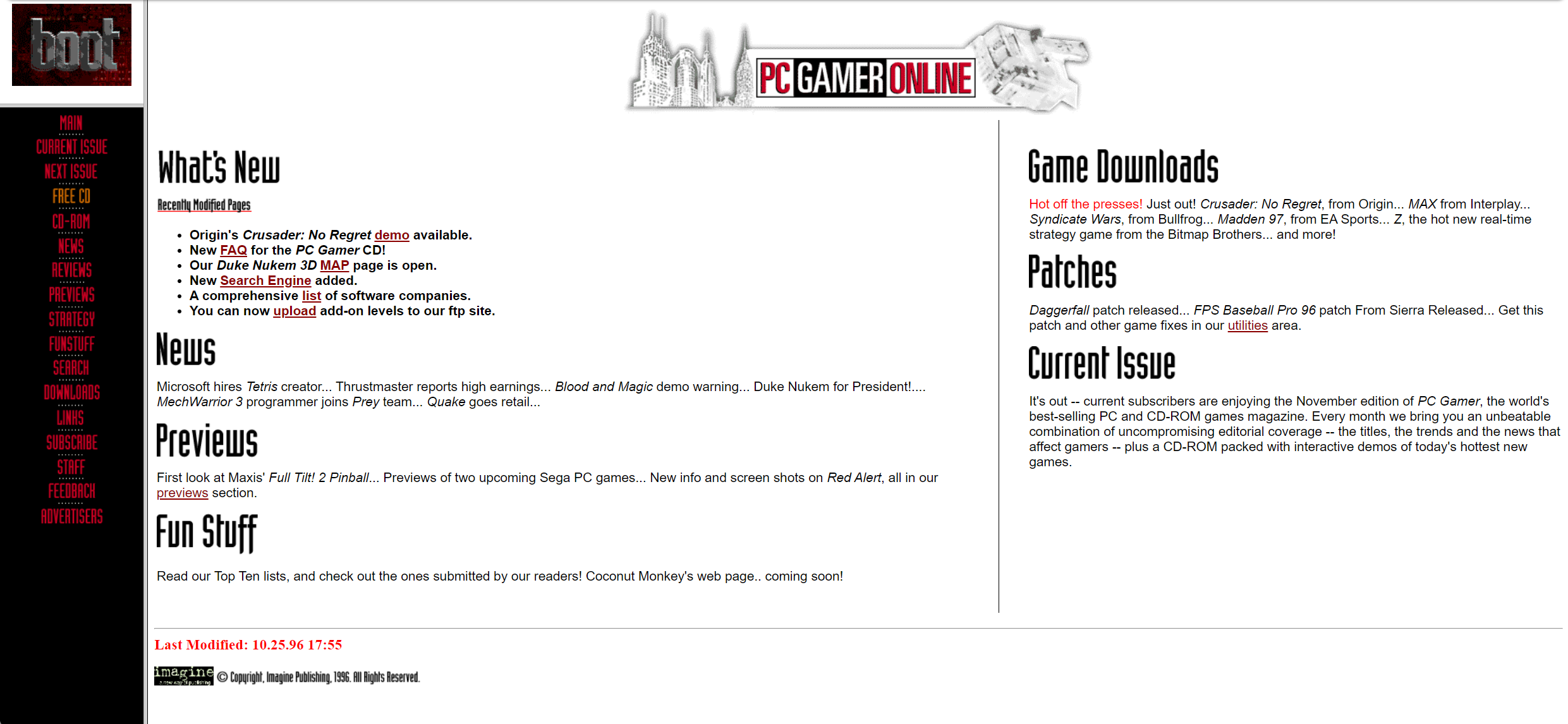
The earliest archived edition of pcgamer.com leads with the splash screen at the top of this article. "Welcome to cyberspace, pal," the nighttime skyline seems to say. "Click to continue if you dare."
The biggest gaming news, reviews and hardware deals
Keep up to date with the most important stories and the best deals, as picked by the PC Gamer team.
You just can't beat this era of web design. Images had to be included sparingly, so they're used like the weird little drawings in illuminated medieval manuscripts: big, splashy banners or doodles stuck in the margins. Almost everything else is presented as lines of plain text, and by golly, we liked it that way.
In this version of the website, you could enjoy such things as:
- A preview of "Epic's awesome new Quake rival" called Unreal
- New "screen shots" of Red Alert
- A preview of Diablo, "an innovative RPG that's deep enough for hard-core dungeon masters, but accessible enough for the Doom crowd."
- An FTP server for the uploading of add-on levels (this sounds dangerous)
- Download pages for Duke Nukem 3D maps and Doom WADs, including the bizarre Marine Doom (not Doom under the ocean, tragically, but Doom for US Marines)
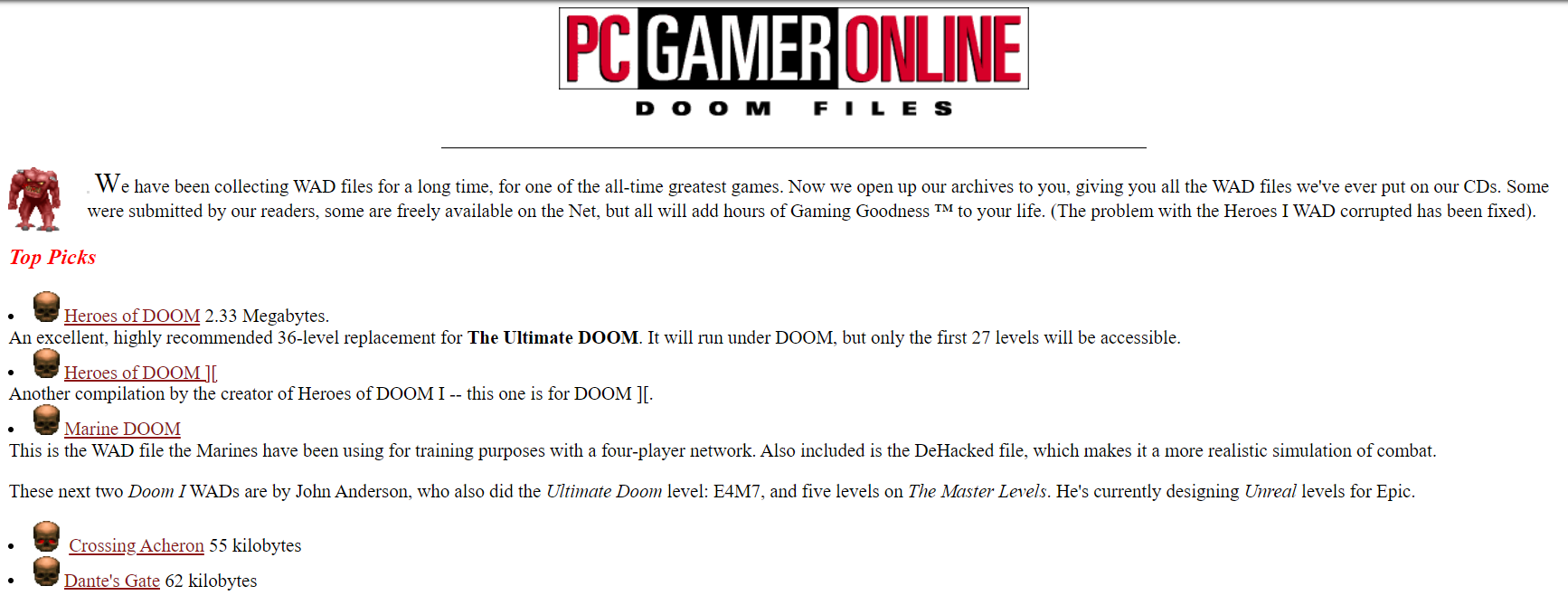
1997 — Fun stuff!
Like every good website (or "web site") in the '90s, pcgamer.com featured a "Fun Stuff" section. That "fun stuff" included a list of reasons PC Gamer flew for the Empire in X-Wing vs TIE Fighter, the connection information for an ancient graphical chat room, and a bunch of joke "Top 10 Lists" a la David Letterman, many reader-submitted. Here is my favorite:
Top Ten Things the "95" in "Windows 95" Really Stands For
by James H.K. Lee
10. The number of floppies it will ship in.
9. The percentage of people who will have to upgrade their hardware.
8. The number of megabytes of hard disk space required.
7. The number of pages in the *EASY-INSTALL* version of the manual.
6. The percentage of existing windows programs that won't run in the new OS.
5. The number of minutes to install.
4. The number of calls to tech support before you can get it to run.
3. The number of people who will actually PAY for the upgrade.
2. The number of MHz required for the OS to run.
1. The year it was due to ship.
1998 — The job board
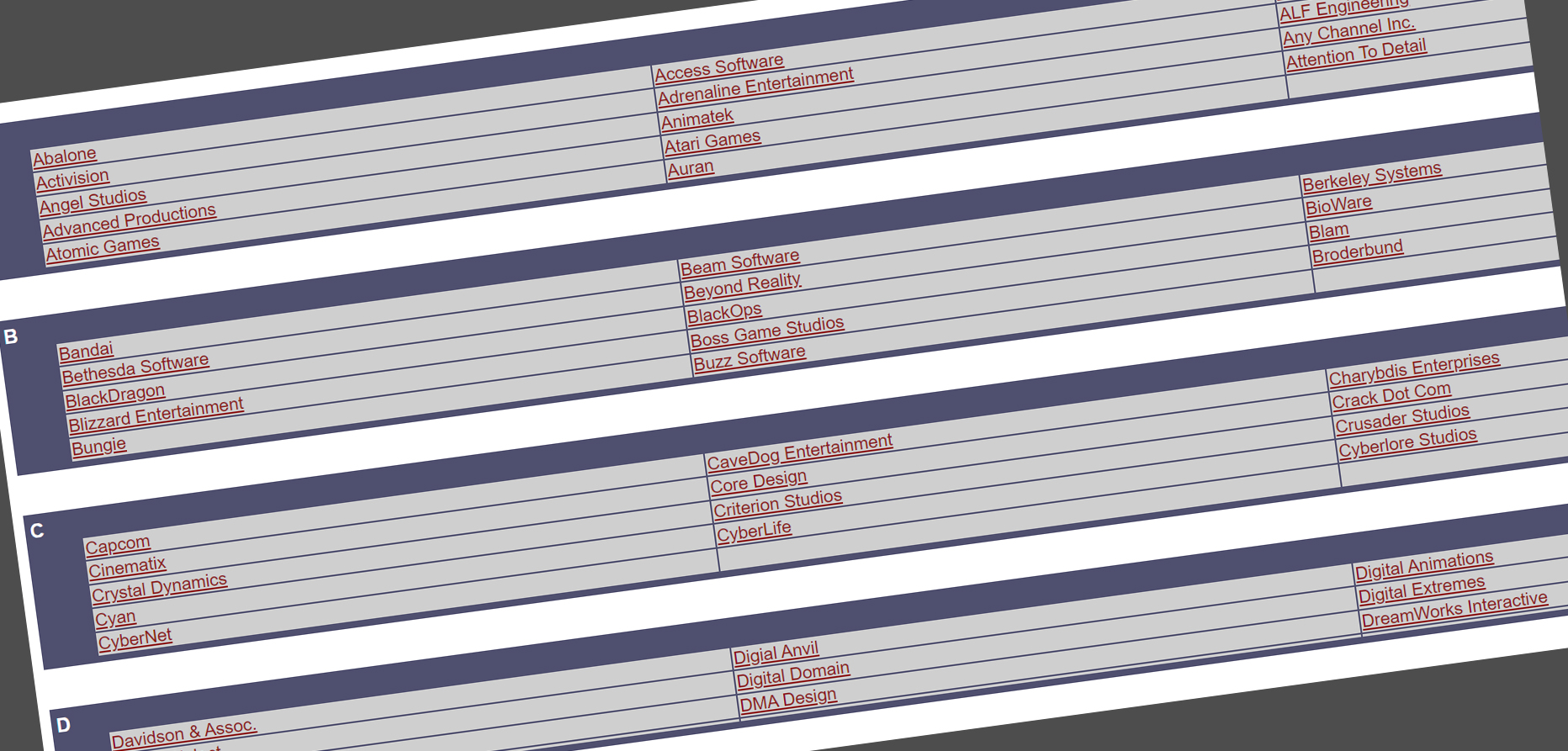
PC gaming has changed a lot since that list of Windows 95 gags was published, but one thing hasn't changed: We still rely on, and like to make fun of, Microsoft.
Another feature of pcgamer.com in the '90s was a list of "opportunities in the interactive entertainment industry." That directory, called the Job Bank, included a number of companies that no longer exist, such as Accolade, but a lot of the companies we still write a lot about today are represented, such as Bethesda, Blizzard, Bungie, BioWare, Larian, Ubisoft (we called it "UbiSoft" back then… terrible), Valve, Electronic Arts, and Insomniac Games.
The 2000s
2000 — Daily Radar integration
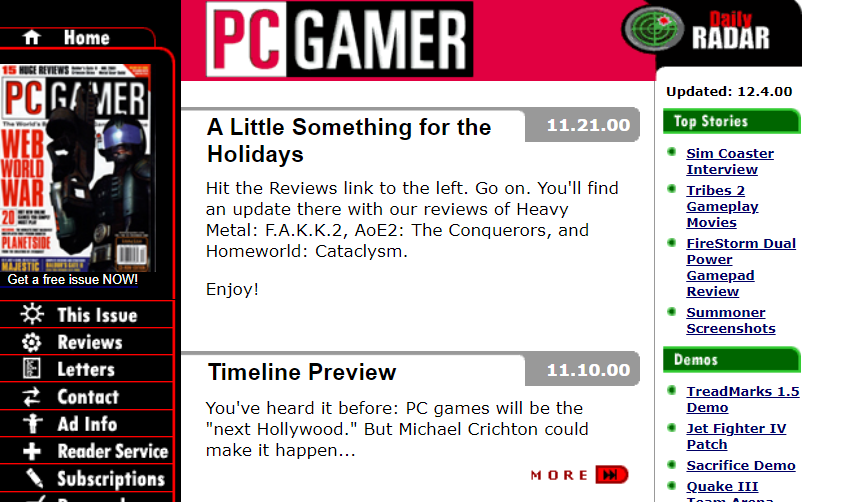
At the start of this decade, PC Gamer's website was partially integrated into the now-defunct Daily Radar, a general gaming and entertainment news site run by our publisher until 2001.
In one news story, we shared an invitation to what's essentially a proto-Discord AMA for Baldur's Gate 2—the only real difference is that you needed a port number:
"BioWare and Black Isle are teaming up to once again speak with the fans and answer questions about Baldur's Gate 2: Shadows of Amn. The chat will take place in room #baldursgate at irc.gamesnes.net on port 6667. The game is not yet gold, but it is still on track for release by the end of the month."
2001 — Post-Daily Radar relaunch
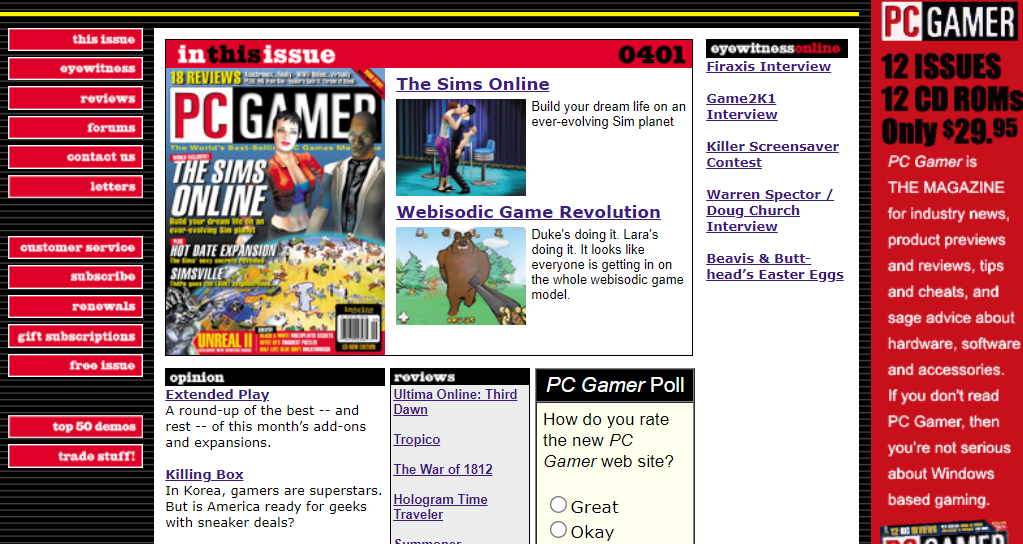
After the end of Daily Radar, a new PC Gamer website was launched. It was more like the '90s site (with no more "Fun Stuff" section, sadly), serving as an extension of the magazine with a reviews archive, downloads, columns, forums, and brief news blurbs.
In late 2001, PC Gamer published this quick report, for instance: "In a natural extension of its expertise, Blizzard has decided to create a MMORPG based in the Warcraft universe. The game has been in development for a year, but is at least another year away from completion."
I wonder how that worked out?
2004 — The PC Gamer forums launch
Here are some of the rules for the PC Gamer forums, as they were in 2004:
- We are a PG-13-rated forum. No pr0n, obscene imagery, or unnecessarily foul language will be tolerated.
- No warez, cracks, keygens, etc. Keep your posts legit.
- Use sigs sparingly, keeping in mind some of our members are burdened with dial-up. If we think your sig is overboard, we'll PM you to let you know.
PC Gamer's original phpBB message board would eventually be closed—the story is more or less that the company decided that maintaining forums was too expensive, and that article comments sufficed—but they returned in 2020 and continue under the leadership of our stalwart community team, Matt Knott, Stevie Ward, Chris Parsons, and Steve Haines.
2006 — The PC Gamer blog

A few years after the 2001 relaunch, a thin blog column was added to the PC Gamer homepage. It wasn't used much at first, but starting in 2006 an effort was made to update the feed regularly. It was genuinely a blog in the old-fashioned sense, featuring casual discourse on PC gaming and what was going on in the office while PCG's editors worked on each issue.
In one post from 2007, for example, former PC Gamer EIC Logan Decker (senior editor at the time) made some prescient complaints. He denounced PC peripherals whose little red lights didn't turn off (on the basis that in a dark room they remind him of the red-eyed pig from The Amityville Horror), and demanded to know why we were still storing data on "magnetized mechanical platters that rotate on a spindle like one of your Dad's old Simon and Garfunkel 45s."
His latter grievance has, finally, been taken care of by the rise of SSDs. As for the lights, well… I can't say that my PC resembles the beady eyes of a pig anymore, but I'm not sure if a pig with rainbow disco eyes is much of an improvement.
2008 — Radar redux
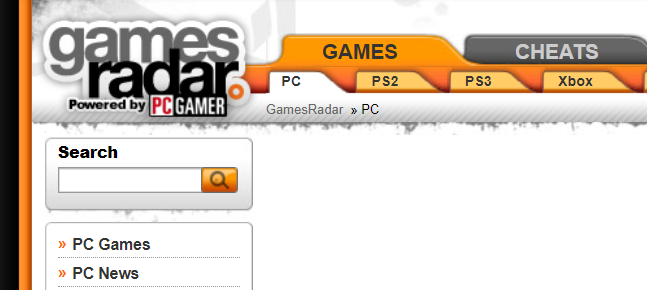
In the late 2000s, pcgamer.com was briefly subsumed by another Radar: multi-platform gaming site GamesRadar, which launched after the closure of Daily Radar. The pcgamer.com URL redirected to GamesRadar's PC section, which was labeled "GamesRadar: Powered by PC Gamer."
As I recall—I was at the company at this point—the PC Gamer staff was not especially pleased about becoming a sidecar on a younger publication. It didn't last long. (But everyone's pals now!)
The 2010s
2010 —The Wordpress era
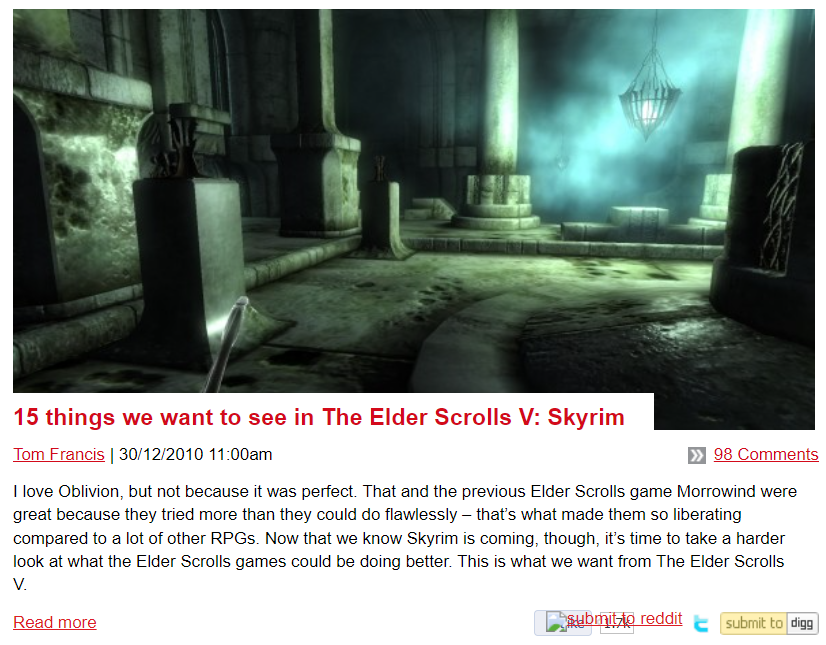
By mid-2010, pcgamer.com had again been decoupled from Radar, and was looking much more like it looks now, with a nav bar across the top. The blog feed returned with a much wider column and a greater focus on daily news posts, interviews, previews, and other staples of PC Gamer's website today. (But also a "submit to Digg" button, so there's no question what internet era we're looking at.)
From here on, I can speak from personal experience, since I joined PC Gamer in 2011. Not that there are any big secrets to share:
- It was a Wordpress blog
- Sometimes we played Unreal Tournament 2K4 instagib after work
2011 — Chris Livingston documents life in Skyrim
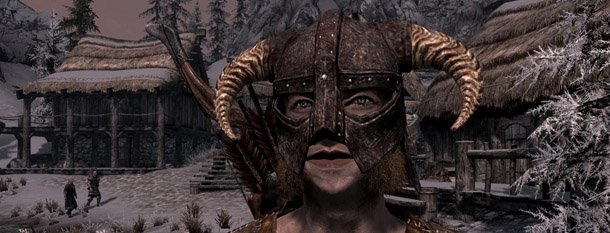
Multi-part diaries about adventures in open world games became a PC Gamer staple in the 2010s, exemplified by 10-part Chris Livingston series The Elder Strolls, in which he attempted to play Skyrim as a hapless NPC rather than an adventurer.
"I won't be looting ghoul-infested crypts or rampaging through bandit-occupied forts, I won't be helping citizens with their various problems and quests, and I certainly won't be awakening any dragons," Chris wrote in the introduction to his first PC Gamer feature. "My name is Nordrick. I'm not a hero, I'm an NPC, and I'm here not to play Skyrim, but to live in it."
Chris is now one of PC Gamer's most prolific writers, and continues to document his adventures, or non-adventures. He most recently followed a Cities: Skylines 2 citizen around for their entire life. A classic Chris thing to do.
2014 — The PC Gamer Show
No, not the PC Gaming Show, the big PC gaming showcase we put on every year in June, with a second show coming up at the end of November this year. I'm talking about the PC Gamer Show, a biweekly web show we started in 2014 and originally produced in the US office. (No, not the US Office, a nine-season sitcom adapted from the UK show of the same name. I'm talking about the building we used to work in.)
My favorite segment, embedded above, was when we edited a GTA 4 ini file to give all the cars zero friction, and then challenged each other to a race through Liberty City.
The PC Gamer Show later became the name of a US-produced livestream and podcast that ran for years alongside a 73-episode PC Gamer UK podcast that started in 2016. Prior to those shows, there were also hundreds of audio and several video podcast episodes recorded by the US team starting in 2005, as well as a 93-episode long PC Gamer UK podcast that existed before the 2016 version.
We just really like starting podcasts, a fact which will come up again.
2015 — We finally stop doing Face Offs

Here's some deep PC Gamer lore: We used to have a magazine column called Face Off, where two PC Gamer writers would argue back and forth about some gaming issue for which they held opposing views. Inevitably, we started to struggle to find topics that two staff members genuinely had a substantial disagreement over, so we either went niche—here's one about whether or not a single Hearthstone card should be nerfed, which to be fair was a less-niche topic at the time than it would be now—or treated it like debate class, where one person had to play devil's advocate lest we had no column to put in the magazine that month.
We finally abandoned the format sometime around 2015, but now whenever two PC Gamer staff members disagree about something, we threaten to make them write a Face Off about it. It encourages harmony.
(Actually, though, we just let them campaign for their opposing opinions as separate articles these days. See, for example: "Alyx needs arms" and "Keep Alyx armless.")
2016 — Launch of the current design
The PC Gamer website's current look, or something close to it, first appeared in 2016. At that point, pcgamer.com was much more than a supplement to our lovely magazine, with its own staff and exclusive features, news, and guides.
This is not even in the same quadrant of space as a comprehensive list of all my favorite PC Gamer articles from this era, but here are a few:
- A goat farmer reviews Goat Simulator by Angelina Bellebuono (2014)
- Pillars of Eternity diary: playing as a party of bears by Chris Livingston (2015)
- Meet the biggest scammer in EVE Online by Steven Messner (2016)
- The most metal PC games by James Davenport (2017)
- Why we praise the sun: the story of Dark Souls' most famous gesture by Lauren Morton (2017)
- I sang at a faux-American Idol audition and started a riot in a GTA 5 roleplaying server by Joe Donnelly (2018)
- I put 'Gamer Goo' on my hands, and god help me I actually liked it by Andy Chalk (2018)
- How the '90s family computer shaped a generation's exposure to PC gaming by Alexis Ong (2020)
The 2020s
Today, PC Gamer is one big magazine and website staff spread across the US, Canada, the UK, and Australia, all working together to produce this website and monthly print issues. Many of us already worked from home by the time 2020 came around, so the pandemic didn't prove to be a huge shift in how we work. (Decades of combined experience coordinating friends via IRC, ICQ, AIM, Teamspeak, Ventrilo, and Discord might've helped, too.)
I won't dwell too much on present-day pcgamer.com—you're looking at it right now—but I promised earlier that our habit of starting podcasts would come up again, and of course we couldn't stay away from microphones for long.
PC Gamer's latest podcast, Chat Log, launched this year: It's hosted by Mollie Taylor and Lauren Morton, who've already put out 23 episodes, all of which you can and should watch or listen to here. Maybe in 10 more years we'll have three more podcasts to add to the list, but 500 Chat Log episodes sounds pretty good, too.

Tyler grew up in Silicon Valley during the '80s and '90s, playing games like Zork and Arkanoid on early PCs. He was later captivated by Myst, SimCity, Civilization, Command & Conquer, all the shooters they call "boomer shooters" now, and PS1 classic Bushido Blade (that's right: he had Bleem!). Tyler joined PC Gamer in 2011, and today he's focused on the site's news coverage. His hobbies include amateur boxing and adding to his 1,200-plus hours in Rocket League.

